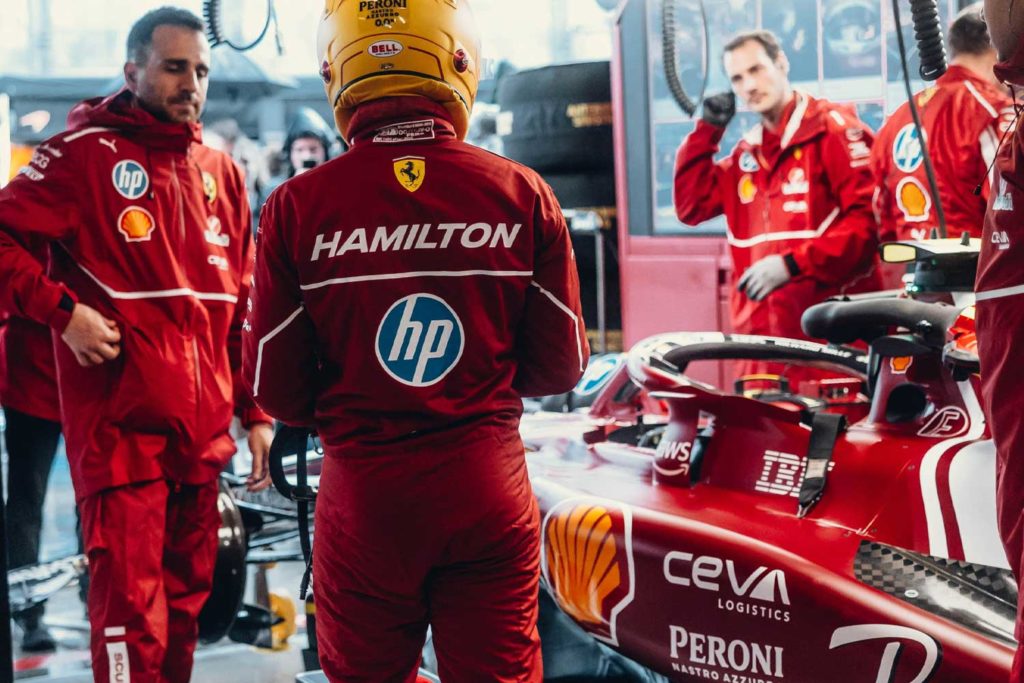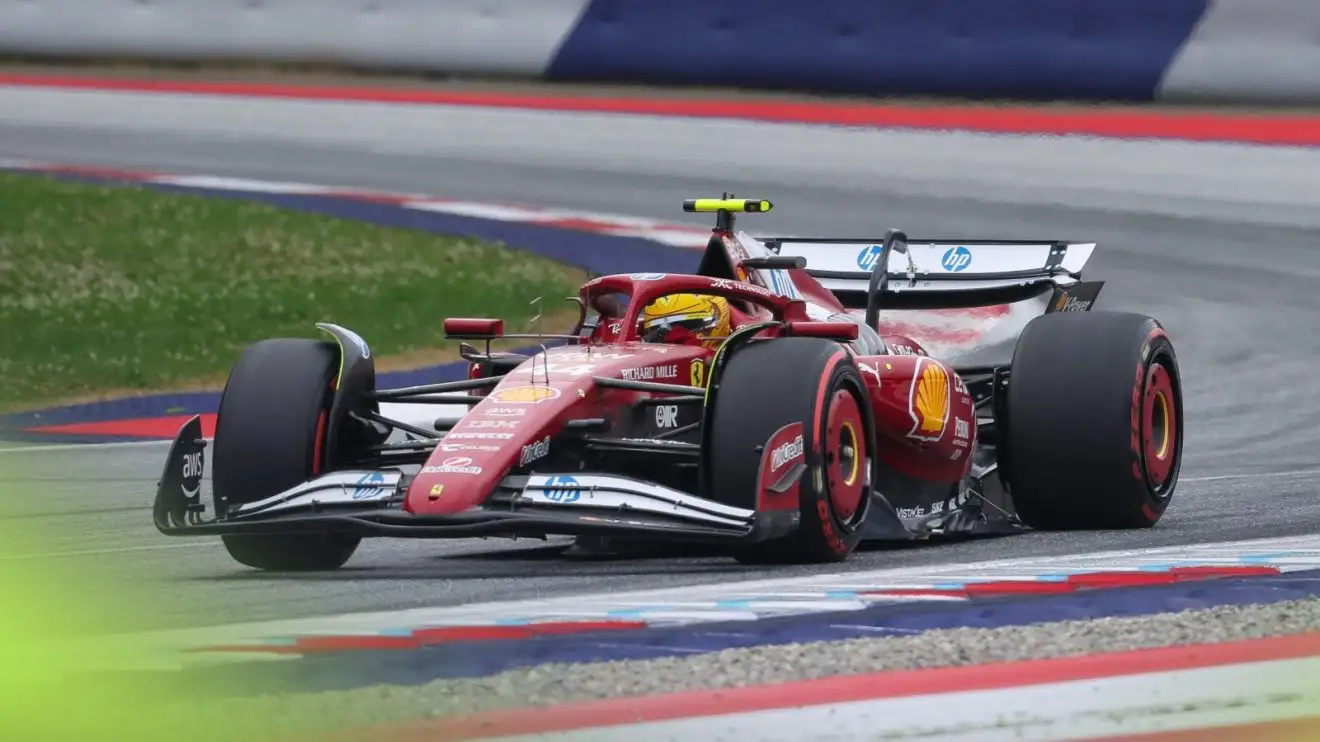Lewis Hamilton’s Ferrari Homecoming at Silverstone: A Disrupted Dream and the Start of Something Bigger
Lewis Hamilton’s long-awaited debut at the British Grand Prix as a Ferrari driver had all the markings of a cinematic triumph: a homecoming in front of 150,000 adoring fans at Silverstone, the track he’s dominated more than any other, and the red of Ferrari gleaming under stormy British skies.
It was supposed to be historic. And in many ways, it still was—but not for the reasons anyone had imagined
Instead of a fairytale victory, Hamilton wrestled the SF-25 through rain-soaked corners and shifting grip levels, ultimately finishing fourth.
While the result earned points, it starkly illuminated the weaknesses of Ferrari’s 2025 car and laid bare the monumental task Hamilton now faces: not just to win with Ferrari, but to help rebuild it into a team that can contend in every condition, every weekend.

The Trouble with the SF-25
Ferrari’s SF-25 had shown glimpses of pace in the dry, particularly in qualifying trim. But once the rain fell at Silverstone, the car’s fundamental flaws were exposed. As Hamilton himself put it, it became “the most difficult car I’ve ever driven in these conditions.” This wasn’t a frustrated exaggeration—it was a diagnosis.
Mid-corner instability, inconsistent mechanical grip, and a skittish rear end under throttle all plagued the car throughout the race. For a driver whose greatest weapon is precision—being able to hit apexes and modulate throttle instinctively—this was a nightmare. The SF-25 fought back in all the wrong ways, snapping loose in slow corners and sliding unpredictably during transitions. Even with Hamilton’s supreme wet-weather skill, the car never gave him the confidence to push.

Technical Frustrations Meet Tactical Feedback
Hamilton’s complaints weren’t generic. His feedback was technical, surgical, and focused. He zeroed in on the car’s instability during low-speed cornering, especially under changing grip levels. Telemetry confirmed his instinct: the SF-25 suffered from abrupt shifts in front-to-rear balance, largely due to an unpredictable aero platform and a rear suspension system that didn’t respond well to load transfer.
Particularly troubling were corners like Village and Vale, where Hamilton repeatedly had to delay throttle application to avoid snap oversteer. Ferrari’s engineers now face the daunting challenge of reworking rear suspension geometry, refining their anti-squat settings, and analyzing how their floor and diffuser interact with ride height variances—especially in wet conditions where track undulations are amplified.
A Mid-Season Struggle, A Long-Term Vision
Ferrari can make some adjustments mid-season—tweaks to the suspension, updated floor components, and minor aerodynamic refinements—but the full fix will have to wait until the 2026 car. What’s striking is how quickly Hamilton has embedded himself into Ferrari’s technical development path. He isn’t merely offering feedback; he’s helping architect the team’s design philosophy going forward.
It’s a role reminiscent of Michael Schumacher’s transformative influence in the early 2000s. Like Schumacher, Hamilton isn’t content to just drive. He wants to shape the machine from the inside out. Ferrari’s challenge is to listen, adapt, and transform—quickly.
The Cost of Inconsistency
Silverstone wasn’t just a missed podium. It was a wake-up call. The 2025 season has already seen six races affected by wet or mixed conditions, and Ferrari’s inconsistency in these scenarios is now a serious liability. While the SF-25 can be competitive in the dry, its vulnerability in the wet creates a strategic gap that McLaren and Red Bull are exploiting.
Hamilton now trails championship leader Max Verstappen by 57 points. With nearly half the season remaining, the deficit isn’t insurmountable, but it is daunting. Ferrari must find performance gains in short order, particularly ahead of key races like Spa and Suzuka—two circuits known for unpredictable weather.
The Culture Shift at Ferrari
Behind the scenes, Ferrari team principal Fred Vasseur is overseeing a subtle yet significant cultural transformation. Historically, Ferrari’s design ethos has prioritized outright performance over adaptability. But in a modern F1 calendar defined by volatility—weather shifts, sprint races, and new circuits—versatility is no longer optional. It’s essential.
Hamilton knows this better than most. At Mercedes, he drove cars that were not only fast but forgiving, capable of winning in rain or shine. He’s now trying to transplant that ethos to Ferrari: a demand for drivability, not just peak speed. And this, perhaps more than any specific design tweak, represents the heart of his Ferrari mission.

The Media and the Message
Predictably, the Italian media reacted with a mix of skepticism and support. Some interpreted Hamilton’s post-race critique as an excuse; others praised his blunt honesty. But internally, his influence is already being felt. Ferrari’s technical team is actively integrating his input into both short-term upgrades and the 2026 car concept.
The updates expected for Spa and Monza—refinements to rear suspension kinematics, diffuser flow conditioning, and minor aerodynamic modifications—are the visible tip of the iceberg. Beneath the surface, a deeper transformation is underway, driven by Hamilton’s relentless push for a car that inspires trust in every condition.
A Legacy in the Making
Hamilton’s move to Ferrari was widely seen as a legacy play—a bid to win in red and cement his place alongside the legends of the sport. But what’s becoming clear is that his true legacy may be something deeper. If he can help reshape Ferrari’s technical culture, embed himself into its engineering DNA, and lead the Scuderia into a new era of adaptability and consistency, it could mark one of the greatest career arcs in F1 history.
And that transformation wouldn’t just benefit Hamilton. It would elevate Ferrari itself—restoring its reputation as a team that doesn’t just chase glory, but earns it through rigor, innovation, and unity between driver and machine.
Looking Ahead
The British Grand Prix wasn’t the coronation many hoped for. But it may prove to be the catalyst that Ferrari and Hamilton needed. As the team turns its focus to Spa, Monza, and the long-term 2026 regulation reset, every piece of data, every race, and every engineering meeting becomes critical.
Hamilton, as always, is playing the long game. And while the Silverstone disappointment may linger, it also marks the moment where the true work begins—where racing passion meets technical precision, and where one of the sport’s greatest drivers begins the process of making Ferrari great again.
In the end, that’s the story that may define this era of Formula 1. Not just a fast car. But a complete one. And not just a legendary driver—but one who rewrote what a driver could be.
Full Video:





